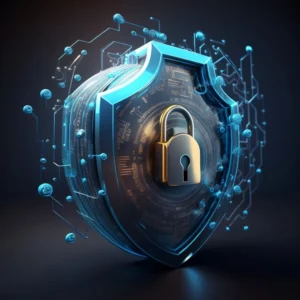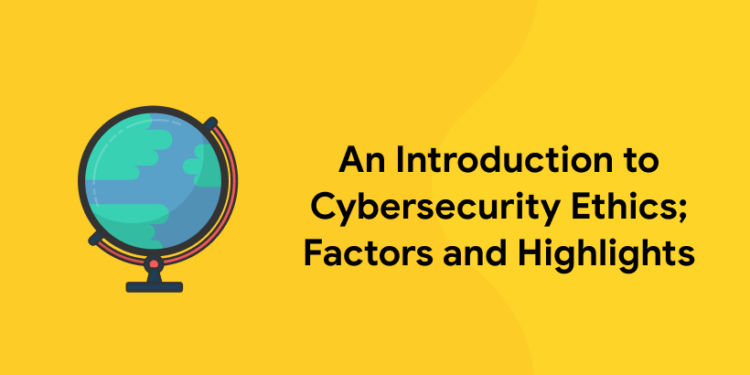Table of Contents
Key Takeaways:
- Cybersecurity ethics provides the essential moral framework guiding professionals in protecting digital information responsibly.
- The distinction between ethical hacking (white hat) and non-ethical hacking (black hat) lies in consent, intent, and legality.
- Fundamental ethical principles include confidentiality, accountability, transparency, integrity, and compliance.
- The field faces ongoing challenges such as ensuring ethical conduct, respecting privacy, managing system access, and adapting laws to emerging technologies.
- Upholding cybersecurity ethics is critical to building trust, safeguarding privacy, and fostering responsible use of technology in today’s digital world.
Introduction
You might have heard about IT professionals earning crores by working in the cybersecurity wing of companies. From there, many understand what is cybersecurity—the practice of protecting digital information and infrastructure from cyber threats. However, a growing concept attached to it is cybersecurity ethics, an increasingly important area guiding the behavior and decisions of cybersecurity professionals.
Cybersecurity ethics is both a guideline and a recruiting criterion in today’s high-stakes cyber environment. If you’re planning to divest your career into cybersecurity, understanding its ethical foundations is essential. Even for those outside IT, grasping key cybersecurity ethics concepts helps make sense of the digital world’s unfolding dynamics.
This blog covers an introduction to cybersecurity ethics, including its core principles, challenges, and the critical role it plays in fostering trust and security in cyberspace.

What Is Cybersecurity Ethics?
Ethics can vary based on culture, region, and personal values, but cybersecurity ethics refers specifically to the moral framework and standards cybersecurity professionals must uphold when managing and securing data.
Cybersecurity involves protecting information stored in electronic systems, which often includes sensitive, personal, banking, economic, and demographic data. This data must be secured not only from external threats but also handled with strict respect for privacy and confidentiality.
Also read: Cybersecurity Career Path
Key Points:
-
Cybersecurity is asubset of information security focused on data in digital formats.
-
Professionals entrusted with cybersecurity have special access and therefore a higher ethical obligation.
-
Upsholding cybersecurity ethics means protecting data while respecting privacy, consent, and legal regulations.
Ethical Hacking vs. Non-Ethical Hacking
Hacking involves accessing systems or data without permission. It splits into two broad categories based on intent and legality:
Non-Ethical Hacking (Black Hat)
-
Unauthorized access for criminal, fraudulent, or malicious purposes.
-
Activities include data theft, spreading malware, or disrupting services.
-
Illegal in most countries and punishable under laws like India’s IT Act.
Ethical Hacking (White Hat)
-
Authorized attempts to identify vulnerabilities and improve security.
-
Ethical hackers mimic black hat techniques but with permission and for the right reasons.
-
Their work helps organizations patch flaws before malicious hackers exploit them.
-
Ethical hacking relies heavily on adhering to cybersecurity ethics to protect privacy and maintain trust.
| Aspect | Black Hat Hacking | White Hat Hacking |
|---|---|---|
| Definition | Unauthorized hacking for malicious intent | Authorized hacking to identify and fix vulnerabilities |
| Purpose | Steal data, cause damage, financial gain, or disrupt systems | Improve security and protect systems from attacks |
| Legality | Illegal and punishable by law | Legal and often employed by organizations |
| Consent | No consent from target | Full consent from target organization |
| Activities | Data theft, spreading malware, denial of service attacks | Penetration testing, vulnerability assessments, security audits |
| Ethical Considerations | None; violates privacy and trust | Follows strict ethical guidelines and confidentiality |
| Impacts | Harmful to individuals, businesses, and governments | Positive impact by strengthening cybersecurity |
| Examples | Cybercriminals, hackers exploiting security breaches | Certified ethical hackers, security consultants |
| Tools Used | Exploits, malware, custom hacking software | Same tools but used for defensive and testing purposes |
Core Principles of Cybersecurity Ethics
Cybersecurity ethics revolves around a set of fundamental principles that guide cybersecurity professionals in their daily activities to ensure responsible and trustworthy behavior when handling sensitive digital information. Understanding and adhering to these principles is essential for building a reputable and secure cyberspace.
1. Confidentiality
-
Ensures that sensitive data such as personal, financial, and business information is accessible only to authorized individuals.
-
Cybersecurity professionals must implement and uphold strict data privacy measures to prevent unauthorized access or leaks.
-
Protecting confidentiality fosters trust among users and organizations, which is crucial in today’s connected world.
2. Accountability
-
Professionals must take full responsibility for their actions and decisions in cybersecurity operations.
-
Maintaining clear records, logs, and audit trails is critical to demonstrate compliance and transparency.
-
Accountability ensures adherence to legal and organizational policies and allows for the investigation of any security incidents.
3. Transparency
-
Openness about data handling practices and cybersecurity measures helps build organizational trust.
-
Transparency includes informing users about what data is collected, how it’s used, and security protocols in place.
-
It also involves communicating breaches immediately and clearly to affected parties.
4. Integrity
-
This principle guarantees that data and systems remain unaltered, accurate, and reliable.
-
Cybersecurity professionals must protect against unauthorized modification or corruption of information.
-
Upholding data integrity ensures users can trust digital services and records, supporting the overall security ecosystem.
5. Compliance
-
Adhering to relevant cybersecurity laws, industry standards, and organizational policies is mandatory.
-
Compliance covers regulations like India’s IT Act, GDPR, HIPAA, and other frameworks protecting digital rights.
-
Staying compliant not only avoids legal penalties but also aligns cybersecurity practices with global ethical standards.
6. Continuous Learning and Adaptability
- The cybersecurity field is dynamic; emerging threats and technologies call for ongoing education.
- Ethical professionals commit to upskilling and reassessing their practices regularly to remain effective and responsible.
- Integratingethical reasoning in daily work helps anticipate and manage complex moral dilemmas arising from new technology.
Challenges to Cybersecurity Ethics
Despite its importance, cybersecurity ethics faces practical and systemic challenges in implementation and enforcement. Understanding these obstacles is key for both professionals and organizations aiming to uphold robust ethical standards.
1. Skill vs. Ethical Values Gap
-
Recruitment often prioritizes technical proficiency over ethical background or values.
-
Professionals with deep hacking skills may lack adequate training in ethical decision-making or awareness of privacy concerns.
-
Bridging this gap requires integrated education that combines technical skills with strong ethical grounding.
2. Risks from Extensive System Access
-
Ethical hackers and cybersecurity specialists often have unrestricted access to sensitive systems and data, which poses risks if ethics are not strictly followed.
-
Improper behavior or negligence can lead to unauthorized data exposure, misuse, or abuse of privileges.
3. Consent and Privacy Concerns
-
Ethical hacking involves testing systems that process personal and confidential data.
-
Sometimes organizations or individuals whose data is tested might not be fully informed or consenting, raising privacy and legal concerns.
-
Ensuring informed consent is a fundamental but difficult ethical requirement in real-world scenarios.
4. Regulatory Limitations
-
Cybersecurity laws and regulations often lag behind the pace of technological advances and emerging cyber threats.
-
Insufficient or outdated legal frameworks hinder comprehensive ethical enforcement and accountability.
-
Policymakers face the challenge of creating agile, enforceable laws without stifling innovation.
5. Global and Cultural Variances
- Cybersecurity ethics can be influenced by cultural norms and regional laws that vary internationally.
- What is considered ethical data handling in one country might differ in another.
- This complicates international cooperation and consistent ethical standards in global cybersecurity.
Also read: Top Cyber Security Languages to Learn
Importance of Cybersecurity Ethics in Today’s World
With the increasing digitization of all aspects of life, cybersecurity ethics play a pivotal role in maintaining a safe, fair, and trustworthy cyber environment for individuals, organizations, and governments.
Building Public Trust
-
Following ethical standards in cybersecurity assures people that their personal and financial data will be treated with respect and protected.
-
Transparency and accountability increase user confidence and willingness to engage with digital services.
Safeguarding Privacy and Rights
-
Cybersecurity ethics drives the protection of fundamental data privacy rights amidst growing surveillance and data collection practices.
-
Ethically responsible cybersecurity ensures that individuals’ digital footprints are not exploited or mishandled.
Enhancing Professional Integrity
-
Ethical behavior distinguishes cybersecurity professionals as trustworthy custodians of critical digital assets.
-
Organizations with strong ethical cybersecurity cultures attract better talent and foster collaboration.
Facilitating Legal Compliance
-
Observing ethics helps organizations avoid legal repercussions related to data breaches and non-compliance with regulations like GDPR and India’s IT Act.
-
Ethical approaches limit risks and associated costs from fines, lawsuits, and reputational damage.
Supporting Innovation and Responsible Use of Technology
-
A robust ethical framework encourages the development and deployment of security technologies that respect human rights and societal values.
-
It helps balance technological progress with protections against misuse and unintended consequences.
Entri’s Cybersecurity Course: Building Ethical and Skilled Professionals
At Entri, the philosophy is clear: technical excellence must be paired with ethical responsibility. Our Cybersecurity course covers expert-led instruction not only in cybersecurity tools and programming but also on the essential moral considerations in the field.
Highlights:
-
Learn the foundational ethical principles and legal frameworks.
-
Offline practical activities that situate ethics in real-world cybersecurity tasks.
-
Mentorship focused on building your personal integrity alongside skills.
-
Get prepared to be a professional trusted by employers and society alike.
- Guaranteed placement upon completion of the course.
Conclusion
As digital threats evolve, cybersecurity ethics remains the steady foundation ensuring security professionals protect data responsibly and respectfully. If you want to build a career combining technical skills and ethical integrity, Entri’s Cybersecurity course offers an unparalleled starting point—equipping you with knowledge, practical skills, and ethical awareness to excel in your profession.
Start your ethical cybersecurity journey today with Entri and become a trusted guardian of the digital world.
Frequently Asked Questions
What is cybersecurity ethics and why is it important?
Cybersecurity ethics guides professionals to act morally and responsibly when protecting digital information, which is vital for trust and legal compliance.
How is ethical hacking different from black hat hacking?
Ethical hacking is authorized and aims to improve security, while black hat hacking is unauthorized and malicious.
What are the challenges in enforcing cybersecurity ethics?
Challenges include balancing tech skills with ethical integrity, ensuring user consent, and keeping laws updated with tech changes.
What ethical principles guide cybersecurity professionals?
Key principles include confidentiality, accountability, transparency, integrity, and compliance.
Does Entri’s Cybersecurity course teach ethics?
Yes, it includes modules on cybersecurity ethics alongside technical training to prepare responsible professionals.












